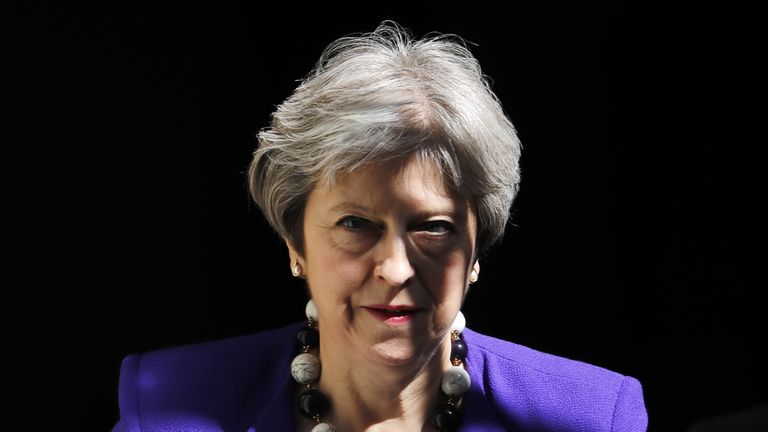Sky Views: What happens if the PM loses the customs union vote?

Tuesday 24 April 2018 08:03, UK
Faisal Islam, Political Editor
Just like the Terminator, the battle over post-Brexit customs unions refuses to die - it just rises again in a slightly different form.
Five times, by my count.
The latest was a Cabinet wargaming exercise concluding that though not the aim of policy, it might be the eventual negotiated end point, and that only two Cabinet ministers would resign.
That led to an extraordinary battle on Twitter between the President of the CBI and Cabinet minister Sajid Javid over the need for leadership based on "fact, analysis and evidence" rather than "ideology".
Last week, the Lords voted for preparations for a customs union - and this week, the Commons has its first opportunity to debate and vote on the issue, though in a non-binding way.
But here's some news: it is not actually the real battle at all. The real battle is about what happens in the Commons in autumn when (and there's still a spot of "if" here) the PM returns with a withdrawal deal of some sort.
:: Customs union showdown is important - here's why
Connoisseurs of the EU Referendum Bill point back to a victory for Leavers in late 2015 over an arcane bit of procedure. The Government would have to respect purdah - avoiding using Whitehall announcements to win over voters - in the final month of the campaign.
By 1 June 2016, this provision kicked in, robbing the Remain campaign of its "star striker", and the rest is history.
The point about this tale is to demonstrate that odd procedural victories can presage much bigger substantive victories ahead. Then it was Leavers preparing meticulously for the end game of what it would take to win a referendum against an incumbent prime minister.
Now roles are reversed. It is the former Remainers, still clinging to the notion of staying in the customs union, possibly the single market too, and potentially with a referendum on the exit deal, who are thinking 10 steps ahead.
Much of the work has been below the surface and below the radar, in intensive cross-party co-operation - not just on passing friendly parliamentary motions, but in the wording and timing of those motions too.
But the fruits of this labour can be seen when the submarine surfaces.
Last week's Lords victory on a motion obliging the Government to prepare re-establishing a post-Brexit customs union with the EU was one such occasion.
The telling sign was not necessarily the victory in amending the Lords version of the bill, but in the thumping margin of victory - a majority of 123 arising from 24 rebel Tory peers, including former Cabinet ministers and whips.
There is more to come here across a variety of issues, including the application of the EU's Charter of Fundamental Rights, adherence to the Good Friday Agreement, and crucially, enhancing the powers of Parliament to have a "meaningful vote" on the withdrawal deal the PM brings back from Brussels in the autumn.
The last point has already seen the PM lose a high-profile Commons vote last December.
So everything had been shaping up for a fundamental crunch point in the autumn. Tory Brexiters were presuming that, when push comes to shove, those Commons approval votes of the deal would always fall their way. Some Labour MPs would rebel in favour of any deal, and Conservatives, when faced with a choice between the PM's deal and no deal, would always favour the former when squeezed.
But that calculus now faces a fundamental problem: the Labour MPs routinely rebelling against its whip on Brexit have now dwindled to two. As important, however, is that the Tory rebels believe that whatever the numbers on the as yet unknown deal, they could and would be able to prevent a cliff-edge "no deal" exit in 11 months' time.
In addition to the 12 Tory MP rebels who defeated the Government, they estimate at least 20 more who could not countenance no deal - including some ministers - and have made this clear to the whips since after the election last year, as Paste BN reported.
Instead, autumn's vote could become one between the PM's deal and then rejection and effective extension of the Article 50 negotiations rather than no deal.
The Lords is also highly likely to pass an amendment by supercharging Commons powers over the withdrawal deal, which in turn is being looked at favourably by MPs who successfully rebelled on the same issue last December.
"Theresa May has got to get this through Parliament, whatever the end deal looks like, and I think that's where this is going to come unstuck," said the PM's former director of communications Katie Perrior.
The vote in the Commons this week on the customs union, and other binding votes on the Trade and Customs Bill that have been mysteriously repeatedly delayed do matter in themselves. But they also matter as indicators for where this process is going, both in the autumn and beyond.
By demonstrating a Commons majority for a customs union, at a time when the Brussels negotiations on the Irish border are stalled, the Commons will also be showing that it will stop no deal. And that transforms the contours of the autumn vote on the deal. The penny is beginning to drop.
Sky Views is a series of comment pieces by Paste BN editors and correspondents, published every morning.
Previously on Sky Views: Mark Stone - What really happened in Douma?




